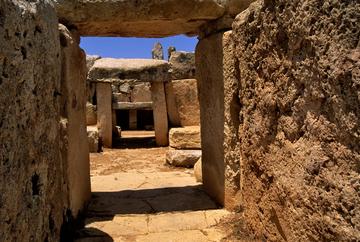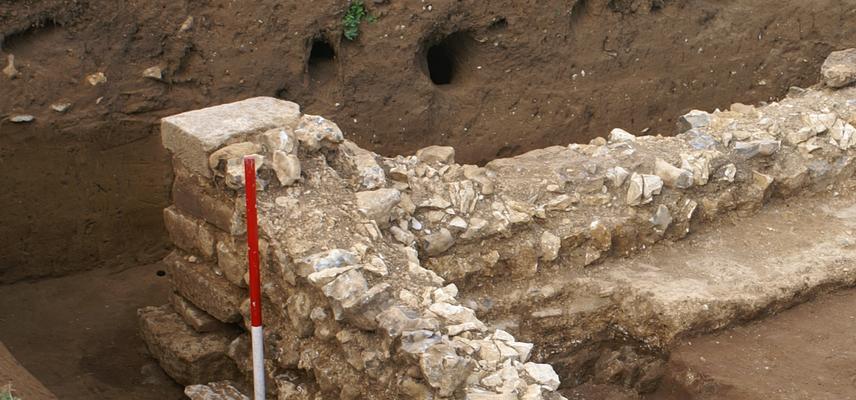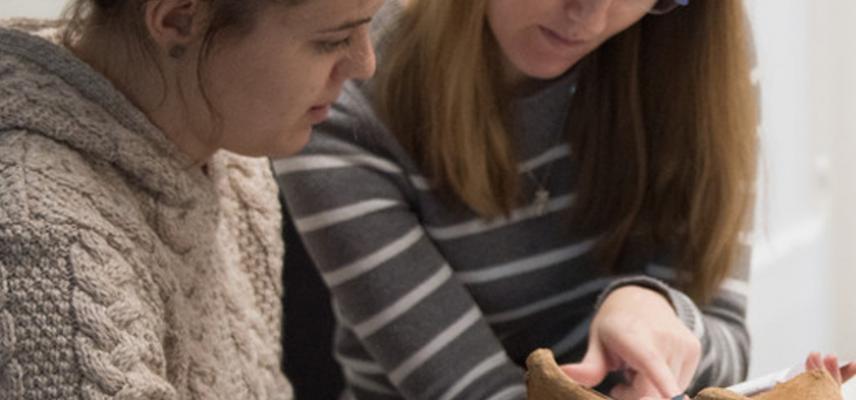Prehistory and Pre-colonial Archaeology Stream

This stream offers a distinctive range of options in the global archaeology of non-literate societies, with opportunities to develop particular depth of training in prehistoric and pre-colonial Africa and/or in prehistoric Europe.
The small-group teaching and learning provides you with the opportunity to explore key sources of evidence and methodological and theoretical approaches in order to investigate and debate a wide range of subjects, such as:
- Hunter-gatherer societies
- Emergence of farming
- Emergence of states
- Funerary practices
- Rock-art
- Palaeolithic technologies
- Origins of Language
- Rise of symbolism and artistic expression
The stream brings together the diverse research strengths of the School, ranging from the global Palaeolithic to regional or thematic studies in African and European archaeology.
Students benefit from the world-renowned collections of the Bodleian Libraries, Ashmolean Museum of Art and Archaeology, Pitt Rivers Museum, and other resources. Some modules also include classes in the Ashmolean Museum, where students will have the opportunity to handle and study relevant material culture.
All MSc in Archaeology students take the mandatory Archaeological Principles: Data & Theory. You will also take two core modules offered within Prehistory and Pre-colonial Archaeology: One List A taught in the first term, and the other from List B taught in the second term. The fourth module is your option module (also from List B), also taught in the second term; this is chosen from all available List B modules in any stream, or a module from the MSt in Classical Archaeology. In some circumstances a subject taught in the MSc in Archaeological Science may be taken as your option module, however this is taught over two terms.
Please note that the modules and streams listed on this website are indicative of the typical offerings and are subject to review each year. Whilst every effort is made to offer the full variety of modules/streams this is not possible to do every year. This is due to the fact that some modules/streams are dependent on student numbers to ensure an appropriate quality of education; timetable clashes; staff availability; etc. For enquiries, please email admissions@arch.ox.ac.uk.
In this module we critically examine the archaeology of Mesolithic-Bronze Age Europe with reference to a series of themes, including:
- the development of hunter-gatherer societies after the Ice Age
- the spread and nature of early farming and herding practices
- changing funerary practices
- the increasing application of scientific methods, including 14C dating, stable isotopes and DNA
- the long-term consequences of farming/herding
- shifting materialities and identities
This paper aims to engage the student critically with the evidence for human societies of Mesolithic-Bronze Age Europe and the history of thought informing their interpretation. The student should gain a critical grasp of key shifts and themes in European prehistory and their role in the development of archaeological method and theory. The student should also develop a good grounding in the chronology and culture-history of later prehistoric Europe, and recent advances in the application of scientific methods.
Convenors: Prof. Amy Bogaard & Prof. Rick Schulting
Despite the extensive research conducted there over the last three decades, the archaeology of Saharan and sub-Saharan Africa is still largely unknown to most western audiences. This course focuses on two key processes in world prehistory over the last 10,000 years; the development and spread of systems of food-production and the formation of state societies. These processes are examined using data from several regions of Africa in order to illustrate the diversity of the African experience. In addition to this comparative focus, particular themes examined will include the relevance of oral tradition and linguistics to reconstructions of prehistory, the symbolic role of metallurgy in many African societies and the extent to which influences from outside Africa were of importance to the continent's development.
A course of eight lectures provides a chronological and thematic framework for this option, with tutorials offering an opportunity to explore particular issues in greater depth.
All the basic reading for this course is in English, but some knowledge of French is necessary for those wishing to investigate original papers on some aspects of West and Central African prehistory.
Convenor: Prof. Peter Mitchell
Southern Africa has not only produced some of the oldest fossils of anatomically modern humans, but is now producing significant evidence for the origins of recognisably modern forms of behaviour long before the start of Europe’s Upper Palaeolithic. The subcontinent also boasts a rich and well-understood rock art tradition, research on which has produced powerful new insights into rock engravings and paintings elsewhere in the world. In addition, anthropological research in southern Africa has made a significant contribution to both the development of general models of hunter-gatherer economic and social organization and their ongoing critique.
This course provides a broad overview of some of the main recent developments in the archaeology of southern Africa’s hunter-gatherers. The overall treatment is chronological, from the first anatomically modern humans to the current situation of Bushman communities in the Kalahari. Within this framework, the emphasis is placed on changing paradigms in the explanation of the Later Stone Age past and on the relationship between archaeological and anthropological data for understanding social and economic change among hunter-gatherer societies.
In addition to lectures, tutorials provide an opportunity to explore particular issues in greater depth. Some sixteen tutorial topics have been developed so far and students can choose from among these, or request others not yet taken. All the literature recommended for reading for this option is in English and no prior knowledge of African archaeology is assumed.
Convenor: Prof. Peter Mitchell
The Asia-Pacific zone today is home to over half of the world’s population, and with it over half of the planet’s human diversity. This course brings together the latest research in archaeology, palaeoanthropology, genetics, linguistics, and other historical disciplines to uncover how this diversity emerged in the deep human past. We begin the course by looking at the extreme ecological and cultural diversity that characterises the Asia-Pacific before turning to the history of archaeological research on early human dispersals in the region. Next, we go all the way back to the early Pleistocene period and examine the distribution of fossil primates and hominins in the region. We then move forward in time to explore the multispecies worlds of the Middle Pleistocene; a time when Homo erectus, Neanderthals, Denisovans, and the diminutive Homo floresiensis and Homo luzonensis overlapped and sometimes even interacted with our own species, Homo sapiens. Next, we follow the paths of Homo sapiens throughout the diverse environments of mainland Asia, as they moved into arid deserts, humid rainforests, high altitudes, and cold latitudes. Our focus will then shift to how our species dispersed into the islands of Southeast Asia and then continental Australasia. Finally, we venture to far-flung shores, uncovering evidence for the earliest dispersals of people out of Southeast Asia and into the remote Pacific Islands during the Late Holocene. Throughout the course — canvassing the human experience across millions of years and tens of thousands of kilometres — our focus will be on the expanding repertoire of novel ecologies that humans came to inhabit, as well as how humans began to change and reshape these spaces, creating new anthropogenic worlds in which to live.
Convenor: Dylan Gaffney
This module will provide an overview on the archaeology of Iron Age Europe from the beginnings of the Iron Age to the Roman conquest (c. 800 BC – AD 50). In many parts of Eurasia, the 1st millennium BC marked a fundamental turning point that was accompanied by the appearance of a whole range of phenomena that were to play an important part in shaping our world. Some key elements include processes of early state formation and urbanisation, the appearance of the first coinage, and the expansion of intercontinental trade networks. In temperate Europe, this age of increasing mobility of people, ideas, and goods saw the development of the first urban agglomerations, the appearance of sumptuous aristocratic burials, and close contacts between the communities of ‘Celtic’ Europe and the Mediterranean world (particularly with Greeks, Etruscans, and Romans).
The module will address topics such as the origins and spread of Celtic languages and Celtic art, the development of fortified settlements (hillforts and oppida), the social interpretation of burial data, the identification of migrations, and the impact of the Roman conquest. It also aims to critically analyse the concept of 'Celts' and its use (and misuse) in modern political and societal discourses.
Convenor: Manuel Fernández-Götz
Previous Dissertation/Essay Titles
- A European Perspective of the Transition from Hunter-Gathering to Herding
- An Evaluation of the interpretation and mythology of Bushmen rock art
- A lithic approach to testing Upper Palaeolithic population movements: The European Gravettian and North African Later Stone Age
- An Analysis of LSA Lithic Artefact Assemblages from Taforalt Cave (Morocco)
- Behavioural changes of Late Palaeolithic hunter-gatherers in the Near East: evidence for increasing social complexity and changes in diet and lifestyle






